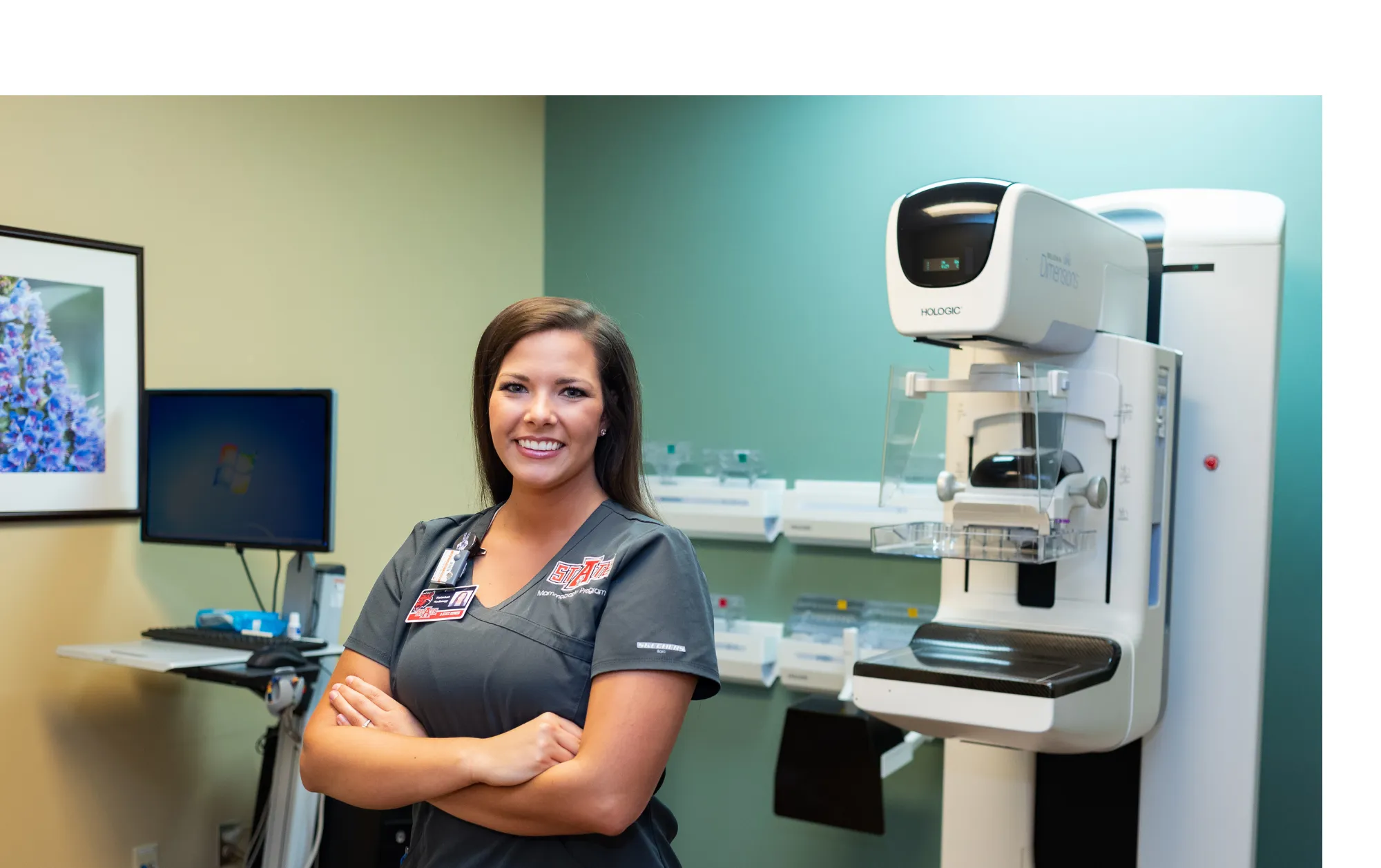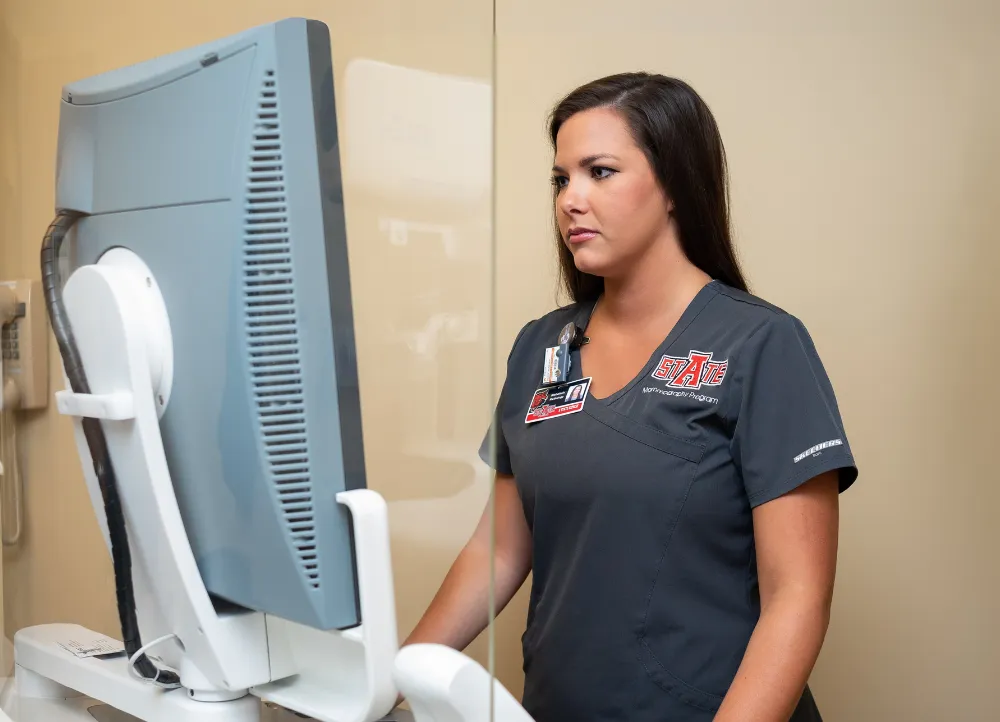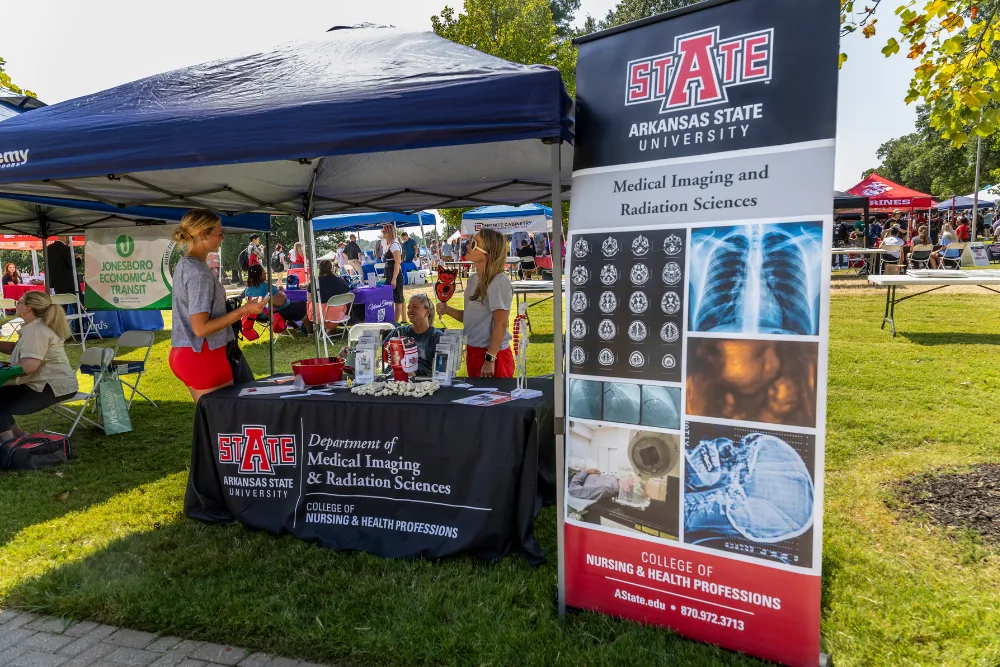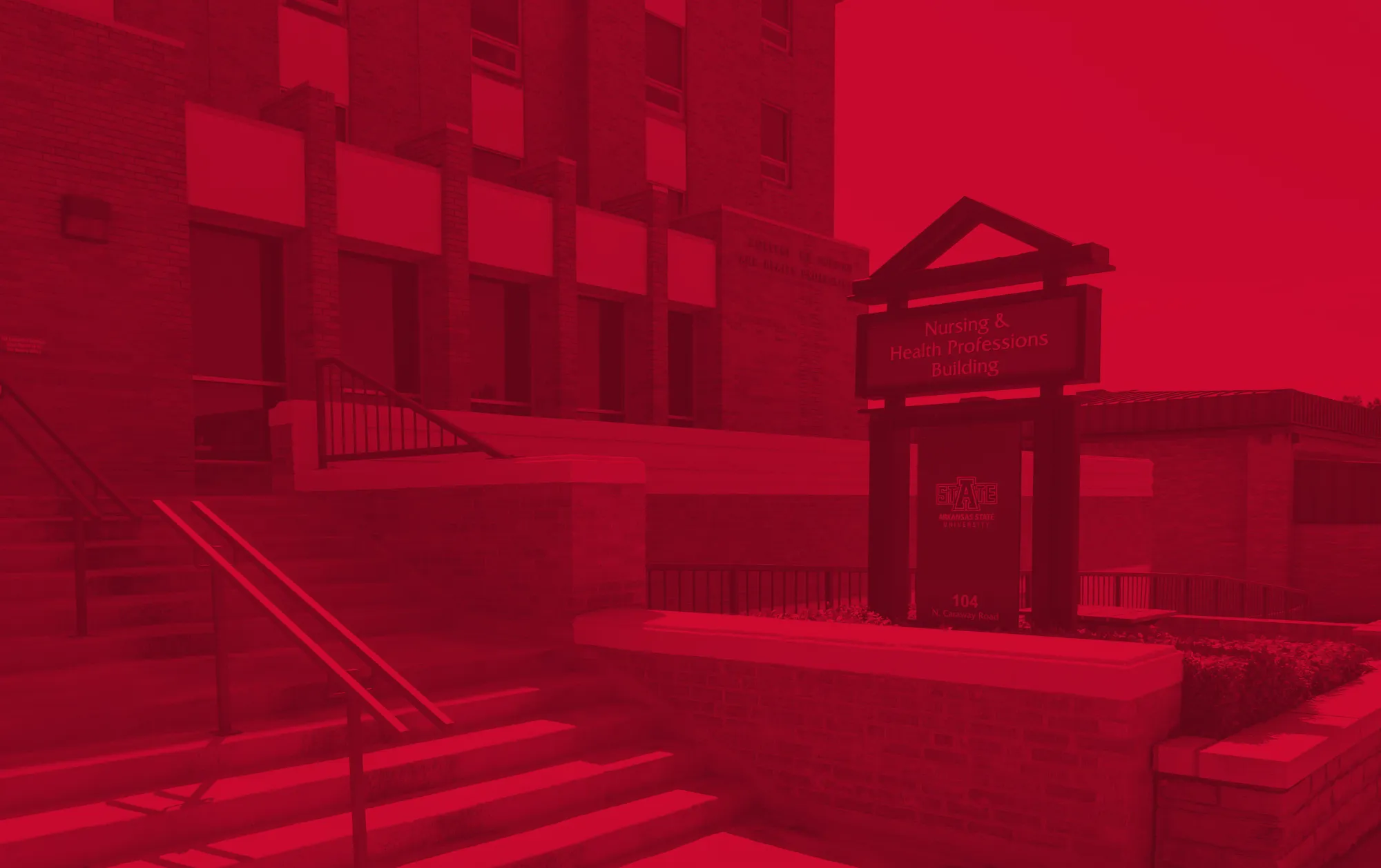BS in Radiologic Sciences
Mammography / Breast Sonography
Interested in a healthcare career focused on women's health and advanced medical imaging? At A-State, a Bachelor of Science in Radiologic Sciences – Mammography/Breast Sonography prepares you for rewarding roles in radiography and breast imaging. With hands-on clinical practice and expert support, you’ll be ready for in-demand healthcare jobs right after graduation.
Application Deadline
Next apply date
April 1Next start date
Fall Semester
Degree Overview
BSRS with an emphasis in Mammography / Breast Sonography
This specialized degree gives solid training in radiography, mammography, and breast sonography. It also qualifies you for ARRT certifications in these important imaging areas. With hands-on clinical experiences across three states, you'll build skills that are in high demand at hospitals and outpatient centers.
College
Nursing & Health ProfessionsAdmission Requirements
- 3.0 GPA (2.0 for transferring students)
- Completed Online Application
-
Application Fee: $30
- Official Transcripts
- Immunization Record
The BSRS program has specific admission requirements. It is recommended that you speak with an advisor.
All Admission RequirementsCareers & outcomes
What could a job for B.S.R.S. – Mammography and Breast Sonography look like?
Graduates from our Mammography/Breast Sonography program work as radiographers or mammographers in hospitals, outpatient clinics, or as travel technologists. The training and certifications offered through this program open doors to specialized roles across various healthcare settings such as hospitals, clinics, or as a travel technologist!
I attribute getting [my] job to my A-State education, especially the clinical hours. That’s where we really learn how to do the work and we make great connections.
ACCREDITED BY JRCERT
Connect With Us.
Program Requirements
The Department of Medical Imaging and Radiation Sciences programs and professions
require
a high level of proficiency in English so that all students will be able to fully
meet academic and
clinical objectives as well as meet criteria for professional licensure.
In addition to tuition and immunization costs, Radiologic Technology students will incur the following expenses:
- All students in the College of Nursing & Health Professions must purchase malpractice insurance prior to rotating through clinical sites. The annual cost of this insurance is approximately $40.
- Students are assessed a fee of $100 per academic year to cover the cost of radiation exposure monitoring devices.
- The cost of textbooks will vary each semester, with a majority of the total cost occurring in the first semester of the professional program. Textbook costs for the first semester may be as much as $700, plus $200 for associated computer software packages. These texts are used throughout the program.
- Students will be required to purchase uniforms through the A-State Bookstore. Approximately $250 should be estimated for uniforms in the first year of the program.
- Students are required to purchase name badges and personalized radiographic markers (approximately $50), and personalized dosimeters ($75/year).
- CPR certification is required. Some classes are free, while others may charge a nominal fee.
- TB mask fittings are required. The fitting is available at A-State within the first few weeks of the fall semester. This is a one-time fee of approximately $25.
- Arkansas State University College of Nursing and Health Professions requires background checks for students admitted to professional programs. This cost of the background check is between $50 and $100.
- Students are required to pay $150/year for online clinical software program to be used for clinical courses.
- Reliable transportation to/from clinical sites for duration of the program.
FRESHMEN STUDENTS
Freshmen applicants who meet one of the following criteria will receive automatic admission to Arkansas State. While you have to meet minimum criteria, test scores are still required:
- 3.00 cumulative high school grade point average (or GED test score equivalent)
- 19 minimum ACT super score or minimum 990 combined SAT super score
- Class rank in the top 20% of applicant's graduating class
- A holistic application review process
Admitted freshmen who require remediation (based on entrance exam scores) or who have less than a 3.00 cumulative high school GPA will be required to participate in the Transition Studies leadership based support program throughout their enrollment at Arkansas State University
ADMISSION APPEALS
Freshmen applicants who do not meet automatic admission standards may be admitted to the university upon approval of the Undergraduate Admissions Appeal Committee. Freshmen approved by the Undergraduate Admissions Appeal Committee will participate in the Transition Studies leadership-based support program. In addition to an official high school transcript and official entrance exam scores, submit to the committee:
- Two letters of recommendation
- Statement of purpose answering the following prompts:
- Why is A-State a good fit for you and your educational goals?
- What are your academic and personal strengths and how do you plan to grow as a student at A-State?
- What experiences outside of the classroom impact or had an impact on your academic performance.
Documents must be submitted at least two weeks before the start of classes for the semester.
FRESHMAN ADMISSION CHECKLIST:
- Completed Online Application
- $30 Application Fee
- Official High School Transcript
- Official ACT/SAT Score
- Immunization Record (2 MMRs)
TRANSFER STUDENTS
ADMISSION CRITERIA:
Transfer students are encouraged to apply for admissions the semester prior to enrolling
in classes. You must have a cumulative 2.0 GPA on ALL transfer work. Students still
in high school who have earned college credit should apply as a freshman.
TRANSFER ADMISSION CHECKLIST:
- Completed Online Application
- $30 Application Fee
- Official college transcript(s) from all colleges attended (emailed attachments and faxes will not be accepted)
- Completion of English Comp I and College Algebra OR official entrance exam scores
- Immunization Record (2 MMRs)
NON-DEGREE STUDENTS
ADMISSION CRITERIA:
Individuals who wish to pursue courses of special interest without submitting academic
credentials may register for a maximum of six hours per semester (or three per summer
term) accumulating up to 12 semester hours of undergraduate non-degree credit. Thereafter,
non-degree students must comply with university admissions requirements or obtain
a written waiver from the Registrar.
CAUTION: Non-degree students should not enroll in courses that are required in the general education program. Courses taken for non-degree credit are not acceptable toward a degree unless validated later by the student's meeting all conditions for admission to the university, including remediation requirements.
Non-degree students are required to meet the same course prerequisites as other students. Non-degree students are generally not eligible to participate in financial aid programs. Due to specific enrollment limitations, non-degree students may not register through the university's web registration system.
NON-DEGREE ADMISSION CHECKLIST:
- Completed Online Application
- $30 Application Fee
- Immunization Record (2 MMRs)
POST-DEGREE STUDENTS
ADMISSION CRITERIA:
Students who have earned a bachelor's degree and plan to enroll in additional undergraduate
coursework should apply as a post-degree student. This includes students who earned
a bachelor's degree at A-State.
POST-DEGREE ADMISSION CHECKLIST:
- Completed Online Application
- $30 Application Fee
- Official college transcript where the bachelor's degree was received
- Immunization Record (2 MMRs)
RETURNING (READMIT) STUDENTS
ADMISSION CRITERIA:
Students who have previously attended A-State but have not completed a bachelor's
degree should apply as a readmit student. If you earned credit at A-State while still
in high school, you should apply as a freshman or transfer student. Students who attended
A-State and then attended another college should apply as a readmit student and submit
the transcript from another institution.
RETURNING ADMISSION CHECKLIST:
- Completed Online Application
- $30 Application Fee
- Completion of English Comp I and College Algebra OR entrance exam scores
- Official College Transcript (If attended another institution after you attended A-State)
- Immunization Record (2 MMRs)
TRANSIENT STUDENTS
ADMISSION CRITERIA:
Students who have not earned a bachelor's degree who are enrolled at another institution
and plan to transfer coursework back to their home institution should apply as a transient
student. Transient students are required to meet the same course prerequisites as
other students. Transient students are not eligible for financial aid or scholarships.
TRANSIENT ADMISSION CHECKLIST:
- Completed Online Application
- $30 Application Fee
- Official college transcript from currently enrolled college or letter of good standing
- Immunization Record (2 MMRs)
CONCURRENT STUDENTS
The A-State Concurrent Program is a partnership between the university and high schools to offer qualified high school students the opportunity to satisfy both high school and university credit requirements simultaneously through specific concurrent credit courses.
1. TAKE A CAMPUS TOUR
Learn about all A-State has to offer while visiting campus! We have a great team of student Chancellor's Ambassadors who love showing future students around the place they call home. To schedule a campus visit, click the link below and select the type of tour, date, and time that works best for you.
2. COMPLETE AN APPLICATION FOR ADMISSION
Please complete an online admissions application. Click the link "Create an account" under the First-Time User heading. You will be emailed a temporary PIN number for your initial log in. Then you can set a new password. This will allow you to log in at any time and check your application status. For more detailed instructions, please check our UG application guide.
Go to the online application >>
3. SUBMIT A $30 NON-REFUNDABLE APPLICATION FEE
You will pay the application fee online when completing your application. To apply for an application fee waiver, please submit the Undergraduate Application Fee Waiver Request Form.
4. REQUEST OFFICIAL TRANSCRIPT
Once you've applied, have your high school send us your transcript. This is typically handled through your high school counseling office. Also, if you've taken any concurrent enrollment college courses, have those official transcripts sent as well.
Official transcripts can be sent electronically through school-verified sites or mailed to:
Office of Admissions, Records and Registration - Arkansas State University
P.O. Box 1800
State University, AR 72467
5. SEND OFFICIAL TEST SCORES
Prospective students may use the following submission methods:
- High School Transcripts and Test Scores:
All high school transcripts, ACT scores, and SAT scores must be sent directly from the high school or issuing institution, either via mail or electronically, to be considered official.
Examples of school-verified electronic sources:- TRIAND
- EDI
- eScript
- Scoir
- Slate.org
- Parchment
Office of Admissions - Arkansas State University
P.O. Box 1800 | State University, AR 72467
If a student hand-delivers a transcript or test scores, they must be in a sealed envelope from the institution to be considered official. - College Transcripts and Test Scores:
All college transcripts must be sent directly from the institution via mail or electronically to be considered official.
Accuplacer scores must come directly from the institution or College Board to be considered official.
If a student hand-delivers transcripts or test scores, they must be in a sealed envelope from the institution to be considered official. - Documents Received by A-State Admissions Counselors:
Transcripts, test scores and shot records received by A-State Admissions Counselors during school visits should be uploaded directly into Slate. These documents are considered official if:- They are received directly from a school official.
- They are received from the student in a sealed, school-branded envelope.
- The Admissions Counselor who receives these documents must attest to their authenticity.
- Proof of MMR Immunization:
Students may submit proof of MMR (Measles, Mumps, Rubella) immunization directly. These documents are not required to be in a sealed envelope. - Official Test Scores:
ACT Scores:
ACT scores can be sent directly to Arkansas State University via the high school or through Encoura. For more information on how to send ACT scores, visit ACT Score Sending.
SAT Scores:
SAT scores can be sent directly via the high school or through the College Board. For details on sending SAT scores, please refer to SAT Score Sending.
Accuplacer Scores:
Accuplacer scores can be sent directly by the testing administrator at the testing site, the College Board, or through the A-State Testing Center. For more information, visit Accuplacer Score Information.
6. SUBMIT TWO MMR (MUMPS, RUBELLA & RUBEOLA/MEASLES) RECORDS
MMR records are not required for admissions but must be submitted to enroll in on-campus courses.
Upload a copy of your MMR records to your application or have MMR records sent to:
Office of Admissions, Records and Registration - Arkansas State University
P.O. Box 1800
The following is the most current program effectiveness data. Our programmatic accreditation agency, the Joint Review Committee on Education in Radiologic Technology (JRCERT), defines and publishes this information. Click here (Accredited Program Details -- jrcertaccreditation.org) to go directly to the JRCERT webpage.
Credentialing Examination: The number of students who pass, on the first attempt, the American Registry of Radiologic Technologists (ARRT) certification examination, or an unrestricted state licensing examination, compared with the number of graduates who take the examination within six months of graduation. The five-year average benchmark established by the JRCERT is 75%.
Credential exam rate
| Year | Passed on 1st attempt (6mo) | Pass Rate (1st Attempt) |
|---|---|---|
| 2020 | 6/6 | 100% |
| 2021 | 4/4 | 100% |
| 2022 | 7/7 | 100% |
| 2023 | 2/2 | 100% |
| 2024 | 11/11 | 100% |
| 5-Year Average | 30/30 | 100% |
Job placement
| Year | Employed within 12 mo. | Employment Rate |
|---|---|---|
| 2020 | 6/6 | 100% |
| 2021 | 4/4 | 100% |
| 2022 | 7/7 | 100% |
| 2023 | 2/2 | 100% |
| 2024 | 10/10 | 100% |
| 5-Year Average | 30/30 | 100% |
annual graduation rate
| Year | # of Students Graduated | Pass Rate (1st Attempt) |
|---|---|---|
| 2024 | 10/11 | 92% |


